Comprehensive Report on Assessment in Learning and Development
VerifiedAdded on 2023/06/16
|11
|1735
|258
Report
AI Summary
This report provides a comprehensive overview of assessment in learning and development. It begins by explaining the functions of assessment, including detecting issues, decision-making, screening, placement in remedial courses, instructional planning, and providing feedback. It defines key asse...
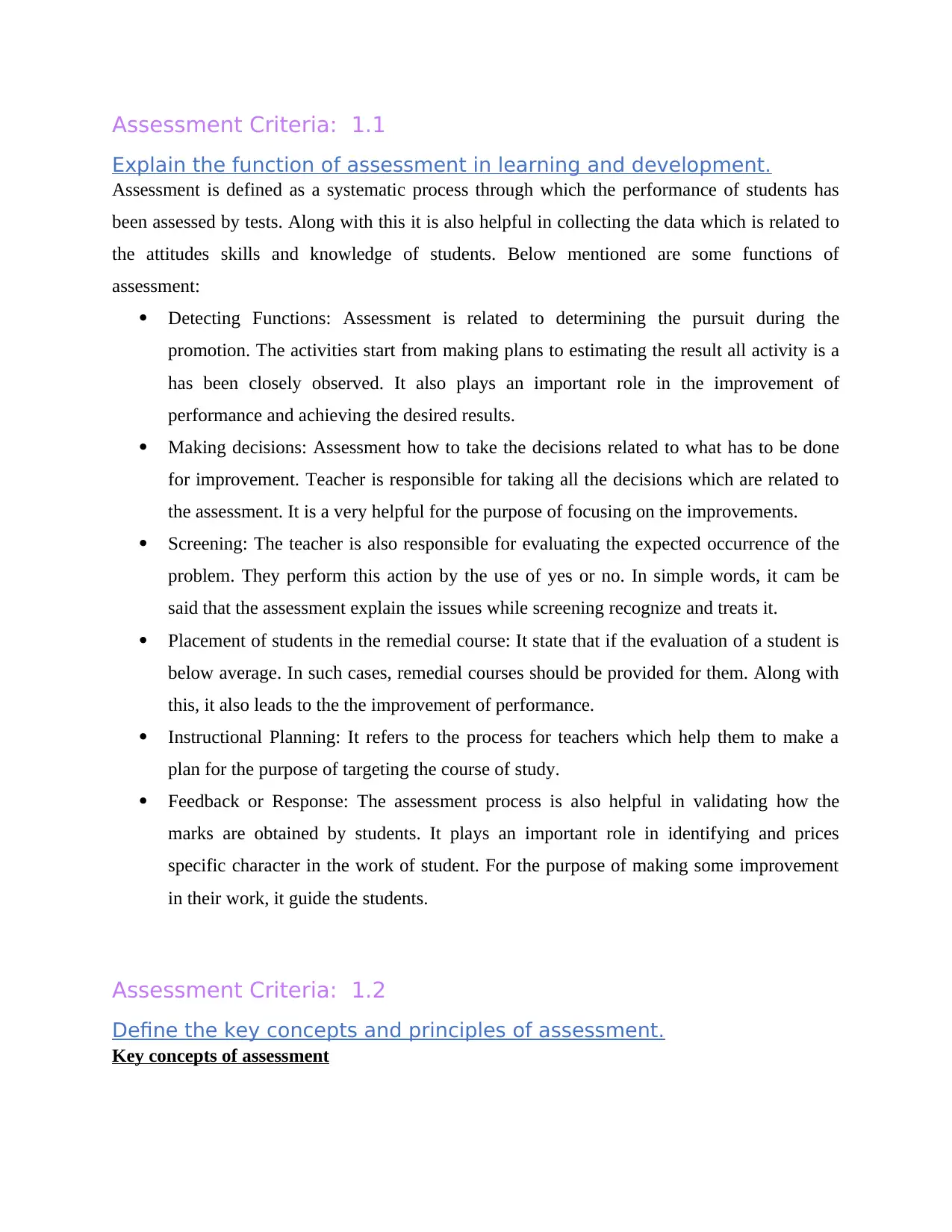
Assessment Criteria: 1.1
Explain the function of assessment in learning and development.
Assessment is defined as a systematic process through which the performance of students has
been assessed by tests. Along with this it is also helpful in collecting the data which is related to
the attitudes skills and knowledge of students. Below mentioned are some functions of
assessment:
Detecting Functions: Assessment is related to determining the pursuit during the
promotion. The activities start from making plans to estimating the result all activity is a
has been closely observed. It also plays an important role in the improvement of
performance and achieving the desired results.
Making decisions: Assessment how to take the decisions related to what has to be done
for improvement. Teacher is responsible for taking all the decisions which are related to
the assessment. It is a very helpful for the purpose of focusing on the improvements.
Screening: The teacher is also responsible for evaluating the expected occurrence of the
problem. They perform this action by the use of yes or no. In simple words, it cam be
said that the assessment explain the issues while screening recognize and treats it.
Placement of students in the remedial course: It state that if the evaluation of a student is
below average. In such cases, remedial courses should be provided for them. Along with
this, it also leads to the the improvement of performance.
Instructional Planning: It refers to the process for teachers which help them to make a
plan for the purpose of targeting the course of study.
Feedback or Response: The assessment process is also helpful in validating how the
marks are obtained by students. It plays an important role in identifying and prices
specific character in the work of student. For the purpose of making some improvement
in their work, it guide the students.
Assessment Criteria: 1.2
Define the key concepts and principles of assessment.
Key concepts of assessment
Explain the function of assessment in learning and development.
Assessment is defined as a systematic process through which the performance of students has
been assessed by tests. Along with this it is also helpful in collecting the data which is related to
the attitudes skills and knowledge of students. Below mentioned are some functions of
assessment:
Detecting Functions: Assessment is related to determining the pursuit during the
promotion. The activities start from making plans to estimating the result all activity is a
has been closely observed. It also plays an important role in the improvement of
performance and achieving the desired results.
Making decisions: Assessment how to take the decisions related to what has to be done
for improvement. Teacher is responsible for taking all the decisions which are related to
the assessment. It is a very helpful for the purpose of focusing on the improvements.
Screening: The teacher is also responsible for evaluating the expected occurrence of the
problem. They perform this action by the use of yes or no. In simple words, it cam be
said that the assessment explain the issues while screening recognize and treats it.
Placement of students in the remedial course: It state that if the evaluation of a student is
below average. In such cases, remedial courses should be provided for them. Along with
this, it also leads to the the improvement of performance.
Instructional Planning: It refers to the process for teachers which help them to make a
plan for the purpose of targeting the course of study.
Feedback or Response: The assessment process is also helpful in validating how the
marks are obtained by students. It plays an important role in identifying and prices
specific character in the work of student. For the purpose of making some improvement
in their work, it guide the students.
Assessment Criteria: 1.2
Define the key concepts and principles of assessment.
Key concepts of assessment
Paraphrase This Document
Need a fresh take? Get an instant paraphrase of this document with our AI Paraphraser
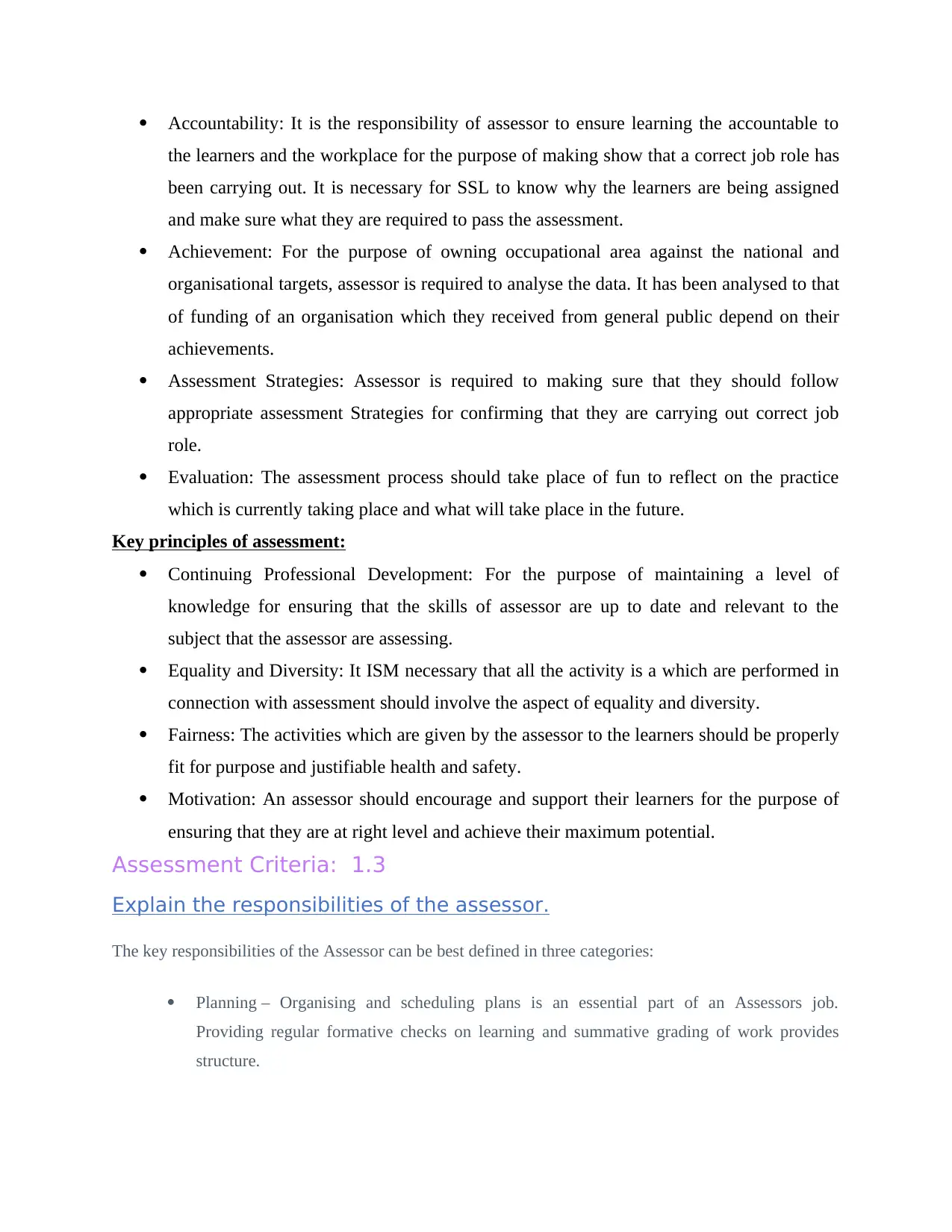
Accountability: It is the responsibility of assessor to ensure learning the accountable to
the learners and the workplace for the purpose of making show that a correct job role has
been carrying out. It is necessary for SSL to know why the learners are being assigned
and make sure what they are required to pass the assessment.
Achievement: For the purpose of owning occupational area against the national and
organisational targets, assessor is required to analyse the data. It has been analysed to that
of funding of an organisation which they received from general public depend on their
achievements.
Assessment Strategies: Assessor is required to making sure that they should follow
appropriate assessment Strategies for confirming that they are carrying out correct job
role.
Evaluation: The assessment process should take place of fun to reflect on the practice
which is currently taking place and what will take place in the future.
Key principles of assessment:
Continuing Professional Development: For the purpose of maintaining a level of
knowledge for ensuring that the skills of assessor are up to date and relevant to the
subject that the assessor are assessing.
Equality and Diversity: It ISM necessary that all the activity is a which are performed in
connection with assessment should involve the aspect of equality and diversity.
Fairness: The activities which are given by the assessor to the learners should be properly
fit for purpose and justifiable health and safety.
Motivation: An assessor should encourage and support their learners for the purpose of
ensuring that they are at right level and achieve their maximum potential.
Assessment Criteria: 1.3
Explain the responsibilities of the assessor.
The key responsibilities of the Assessor can be best defined in three categories:
Planning – Organising and scheduling plans is an essential part of an Assessors job.
Providing regular formative checks on learning and summative grading of work provides
structure.
the learners and the workplace for the purpose of making show that a correct job role has
been carrying out. It is necessary for SSL to know why the learners are being assigned
and make sure what they are required to pass the assessment.
Achievement: For the purpose of owning occupational area against the national and
organisational targets, assessor is required to analyse the data. It has been analysed to that
of funding of an organisation which they received from general public depend on their
achievements.
Assessment Strategies: Assessor is required to making sure that they should follow
appropriate assessment Strategies for confirming that they are carrying out correct job
role.
Evaluation: The assessment process should take place of fun to reflect on the practice
which is currently taking place and what will take place in the future.
Key principles of assessment:
Continuing Professional Development: For the purpose of maintaining a level of
knowledge for ensuring that the skills of assessor are up to date and relevant to the
subject that the assessor are assessing.
Equality and Diversity: It ISM necessary that all the activity is a which are performed in
connection with assessment should involve the aspect of equality and diversity.
Fairness: The activities which are given by the assessor to the learners should be properly
fit for purpose and justifiable health and safety.
Motivation: An assessor should encourage and support their learners for the purpose of
ensuring that they are at right level and achieve their maximum potential.
Assessment Criteria: 1.3
Explain the responsibilities of the assessor.
The key responsibilities of the Assessor can be best defined in three categories:
Planning – Organising and scheduling plans is an essential part of an Assessors job.
Providing regular formative checks on learning and summative grading of work provides
structure.
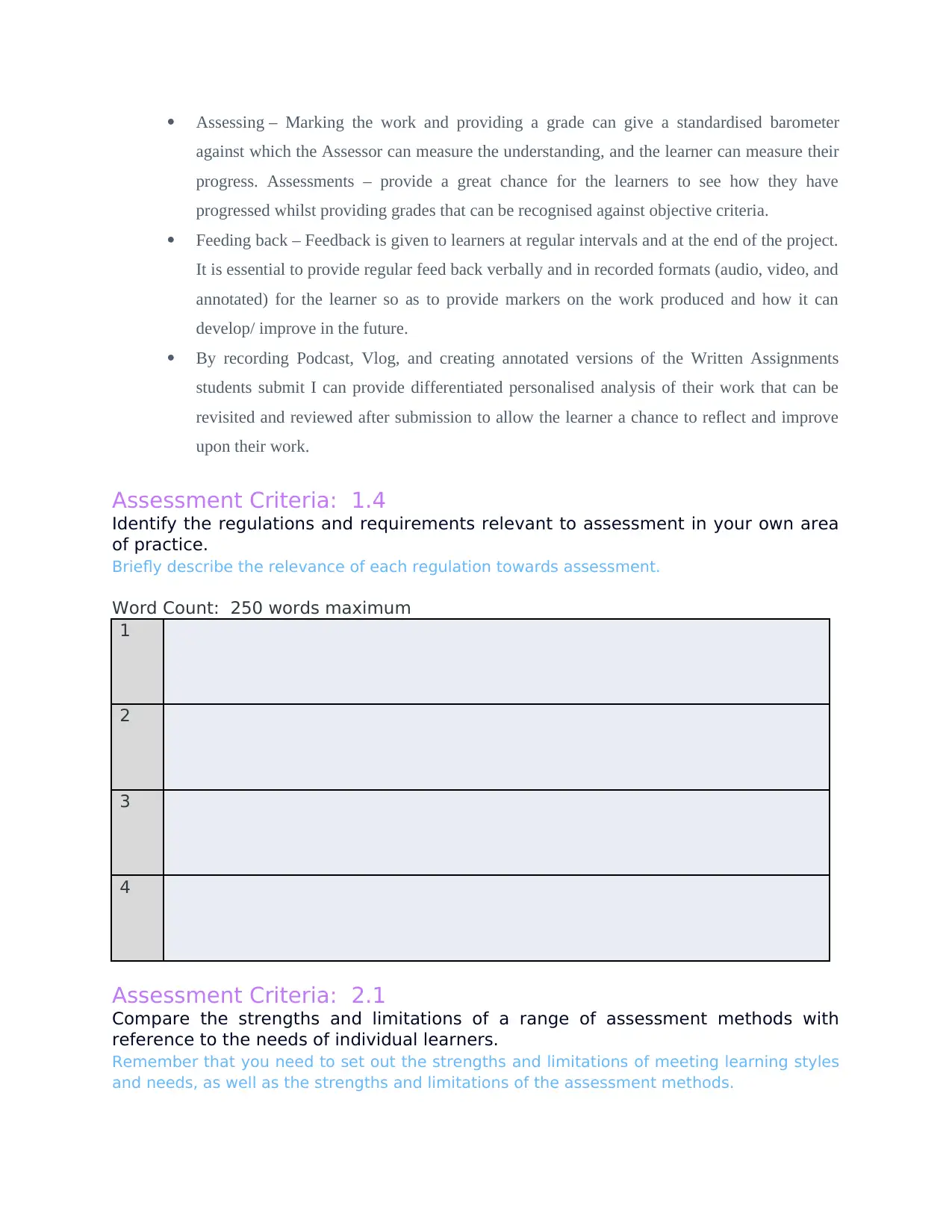
Assessing – Marking the work and providing a grade can give a standardised barometer
against which the Assessor can measure the understanding, and the learner can measure their
progress. Assessments – provide a great chance for the learners to see how they have
progressed whilst providing grades that can be recognised against objective criteria.
Feeding back – Feedback is given to learners at regular intervals and at the end of the project.
It is essential to provide regular feed back verbally and in recorded formats (audio, video, and
annotated) for the learner so as to provide markers on the work produced and how it can
develop/ improve in the future.
By recording Podcast, Vlog, and creating annotated versions of the Written Assignments
students submit I can provide differentiated personalised analysis of their work that can be
revisited and reviewed after submission to allow the learner a chance to reflect and improve
upon their work.
Assessment Criteria: 1.4
Identify the regulations and requirements relevant to assessment in your own area
of practice.
Briefly describe the relevance of each regulation towards assessment.
Word Count: 250 words maximum
1
2
3
4
Assessment Criteria: 2.1
Compare the strengths and limitations of a range of assessment methods with
reference to the needs of individual learners.
Remember that you need to set out the strengths and limitations of meeting learning styles
and needs, as well as the strengths and limitations of the assessment methods.
against which the Assessor can measure the understanding, and the learner can measure their
progress. Assessments – provide a great chance for the learners to see how they have
progressed whilst providing grades that can be recognised against objective criteria.
Feeding back – Feedback is given to learners at regular intervals and at the end of the project.
It is essential to provide regular feed back verbally and in recorded formats (audio, video, and
annotated) for the learner so as to provide markers on the work produced and how it can
develop/ improve in the future.
By recording Podcast, Vlog, and creating annotated versions of the Written Assignments
students submit I can provide differentiated personalised analysis of their work that can be
revisited and reviewed after submission to allow the learner a chance to reflect and improve
upon their work.
Assessment Criteria: 1.4
Identify the regulations and requirements relevant to assessment in your own area
of practice.
Briefly describe the relevance of each regulation towards assessment.
Word Count: 250 words maximum
1
2
3
4
Assessment Criteria: 2.1
Compare the strengths and limitations of a range of assessment methods with
reference to the needs of individual learners.
Remember that you need to set out the strengths and limitations of meeting learning styles
and needs, as well as the strengths and limitations of the assessment methods.
You're viewing a preview
Unlock full access by subscribing today!
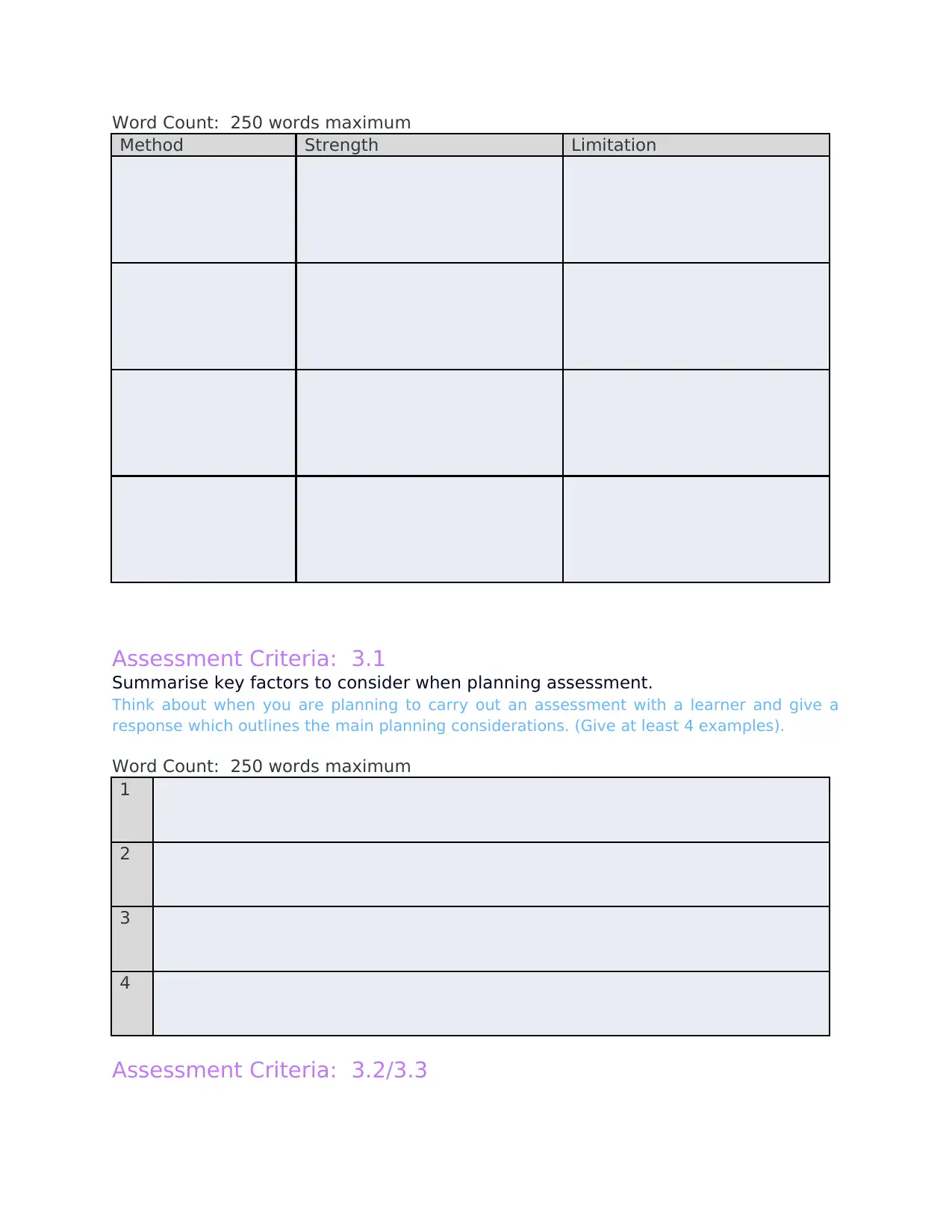
Word Count: 250 words maximum
Method Strength Limitation
Assessment Criteria: 3.1
Summarise key factors to consider when planning assessment.
Think about when you are planning to carry out an assessment with a learner and give a
response which outlines the main planning considerations. (Give at least 4 examples).
Word Count: 250 words maximum
1
2
3
4
Assessment Criteria: 3.2/3.3
Method Strength Limitation
Assessment Criteria: 3.1
Summarise key factors to consider when planning assessment.
Think about when you are planning to carry out an assessment with a learner and give a
response which outlines the main planning considerations. (Give at least 4 examples).
Word Count: 250 words maximum
1
2
3
4
Assessment Criteria: 3.2/3.3
Paraphrase This Document
Need a fresh take? Get an instant paraphrase of this document with our AI Paraphraser
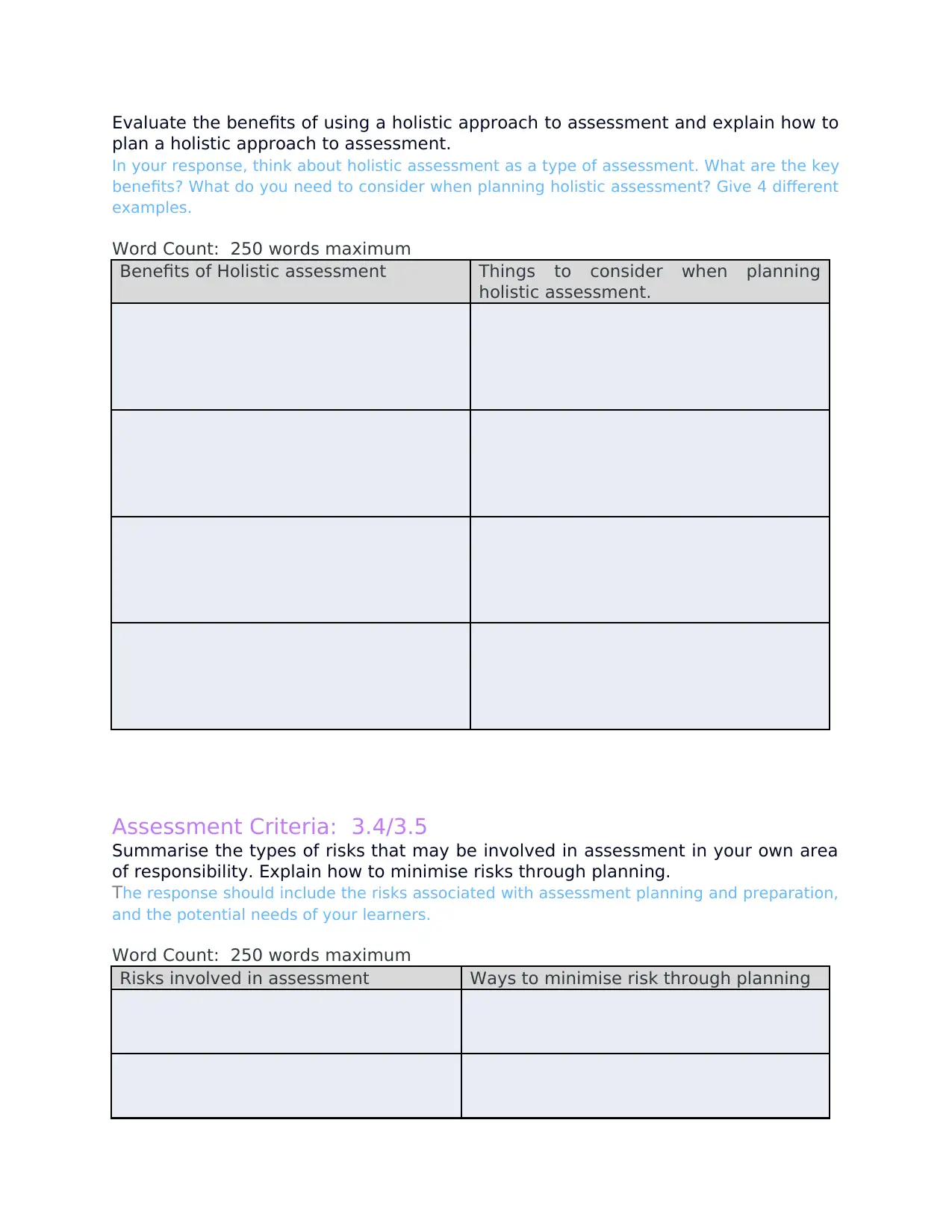
Evaluate the benefits of using a holistic approach to assessment and explain how to
plan a holistic approach to assessment.
In your response, think about holistic assessment as a type of assessment. What are the key
benefits? What do you need to consider when planning holistic assessment? Give 4 different
examples.
Word Count: 250 words maximum
Benefits of Holistic assessment Things to consider when planning
holistic assessment.
Assessment Criteria: 3.4/3.5
Summarise the types of risks that may be involved in assessment in your own area
of responsibility. Explain how to minimise risks through planning.
The response should include the risks associated with assessment planning and preparation,
and the potential needs of your learners.
Word Count: 250 words maximum
Risks involved in assessment Ways to minimise risk through planning
plan a holistic approach to assessment.
In your response, think about holistic assessment as a type of assessment. What are the key
benefits? What do you need to consider when planning holistic assessment? Give 4 different
examples.
Word Count: 250 words maximum
Benefits of Holistic assessment Things to consider when planning
holistic assessment.
Assessment Criteria: 3.4/3.5
Summarise the types of risks that may be involved in assessment in your own area
of responsibility. Explain how to minimise risks through planning.
The response should include the risks associated with assessment planning and preparation,
and the potential needs of your learners.
Word Count: 250 words maximum
Risks involved in assessment Ways to minimise risk through planning
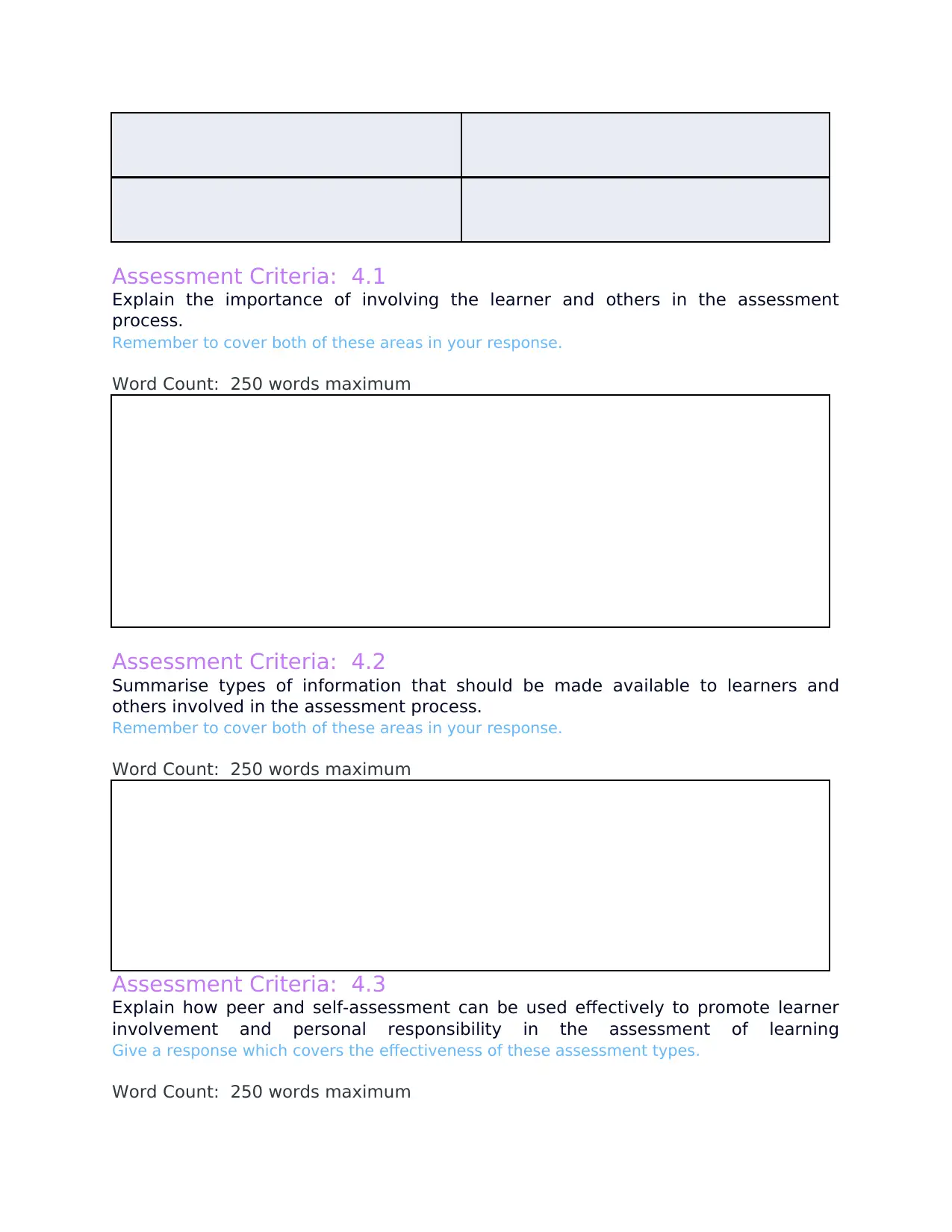
Assessment Criteria: 4.1
Explain the importance of involving the learner and others in the assessment
process.
Remember to cover both of these areas in your response.
Word Count: 250 words maximum
Assessment Criteria: 4.2
Summarise types of information that should be made available to learners and
others involved in the assessment process.
Remember to cover both of these areas in your response.
Word Count: 250 words maximum
Assessment Criteria: 4.3
Explain how peer and self-assessment can be used effectively to promote learner
involvement and personal responsibility in the assessment of learning
Give a response which covers the effectiveness of these assessment types.
Word Count: 250 words maximum
Explain the importance of involving the learner and others in the assessment
process.
Remember to cover both of these areas in your response.
Word Count: 250 words maximum
Assessment Criteria: 4.2
Summarise types of information that should be made available to learners and
others involved in the assessment process.
Remember to cover both of these areas in your response.
Word Count: 250 words maximum
Assessment Criteria: 4.3
Explain how peer and self-assessment can be used effectively to promote learner
involvement and personal responsibility in the assessment of learning
Give a response which covers the effectiveness of these assessment types.
Word Count: 250 words maximum
You're viewing a preview
Unlock full access by subscribing today!
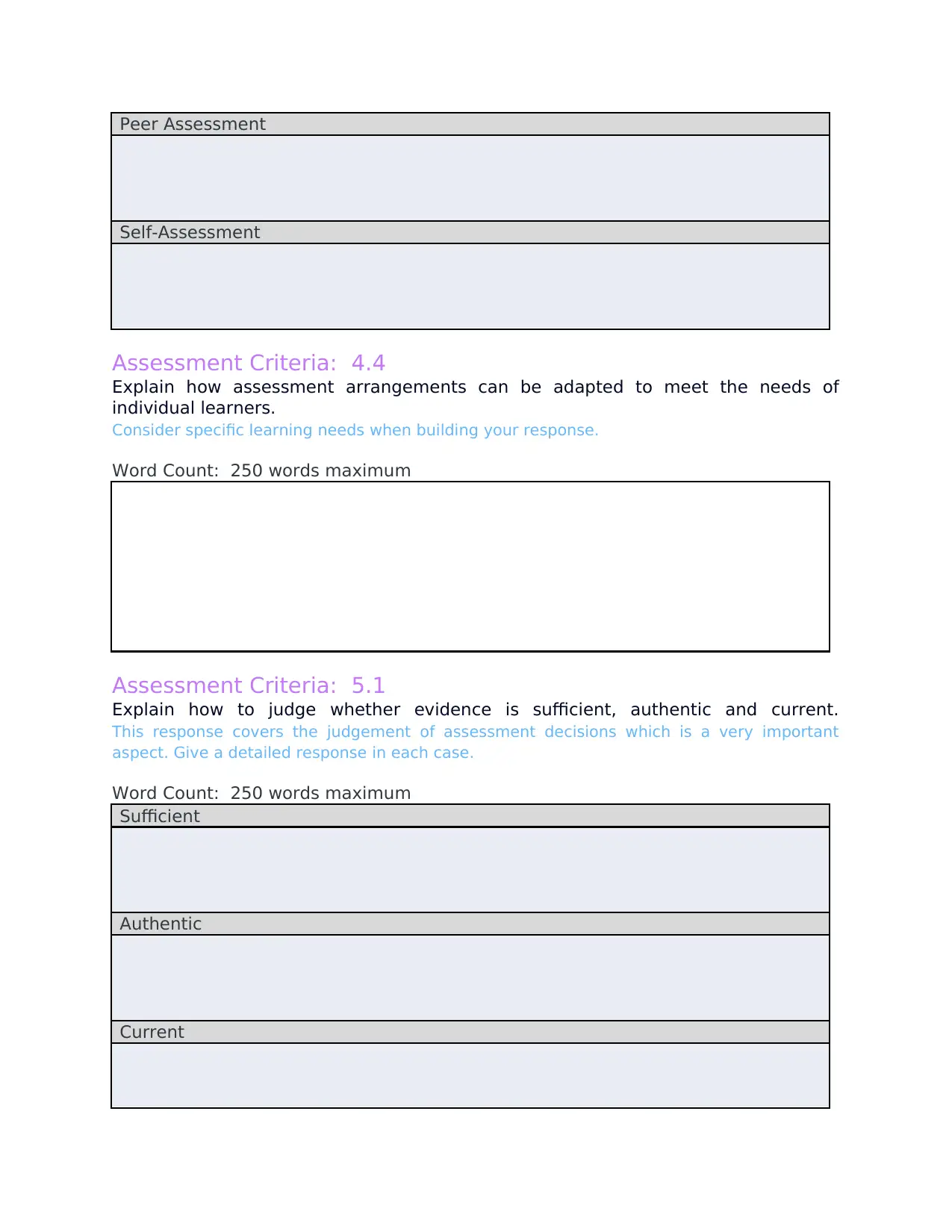
Peer Assessment
Self-Assessment
Assessment Criteria: 4.4
Explain how assessment arrangements can be adapted to meet the needs of
individual learners.
Consider specific learning needs when building your response.
Word Count: 250 words maximum
Assessment Criteria: 5.1
Explain how to judge whether evidence is sufficient, authentic and current.
This response covers the judgement of assessment decisions which is a very important
aspect. Give a detailed response in each case.
Word Count: 250 words maximum
Sufficient
Authentic
Current
Self-Assessment
Assessment Criteria: 4.4
Explain how assessment arrangements can be adapted to meet the needs of
individual learners.
Consider specific learning needs when building your response.
Word Count: 250 words maximum
Assessment Criteria: 5.1
Explain how to judge whether evidence is sufficient, authentic and current.
This response covers the judgement of assessment decisions which is a very important
aspect. Give a detailed response in each case.
Word Count: 250 words maximum
Sufficient
Authentic
Current
Paraphrase This Document
Need a fresh take? Get an instant paraphrase of this document with our AI Paraphraser
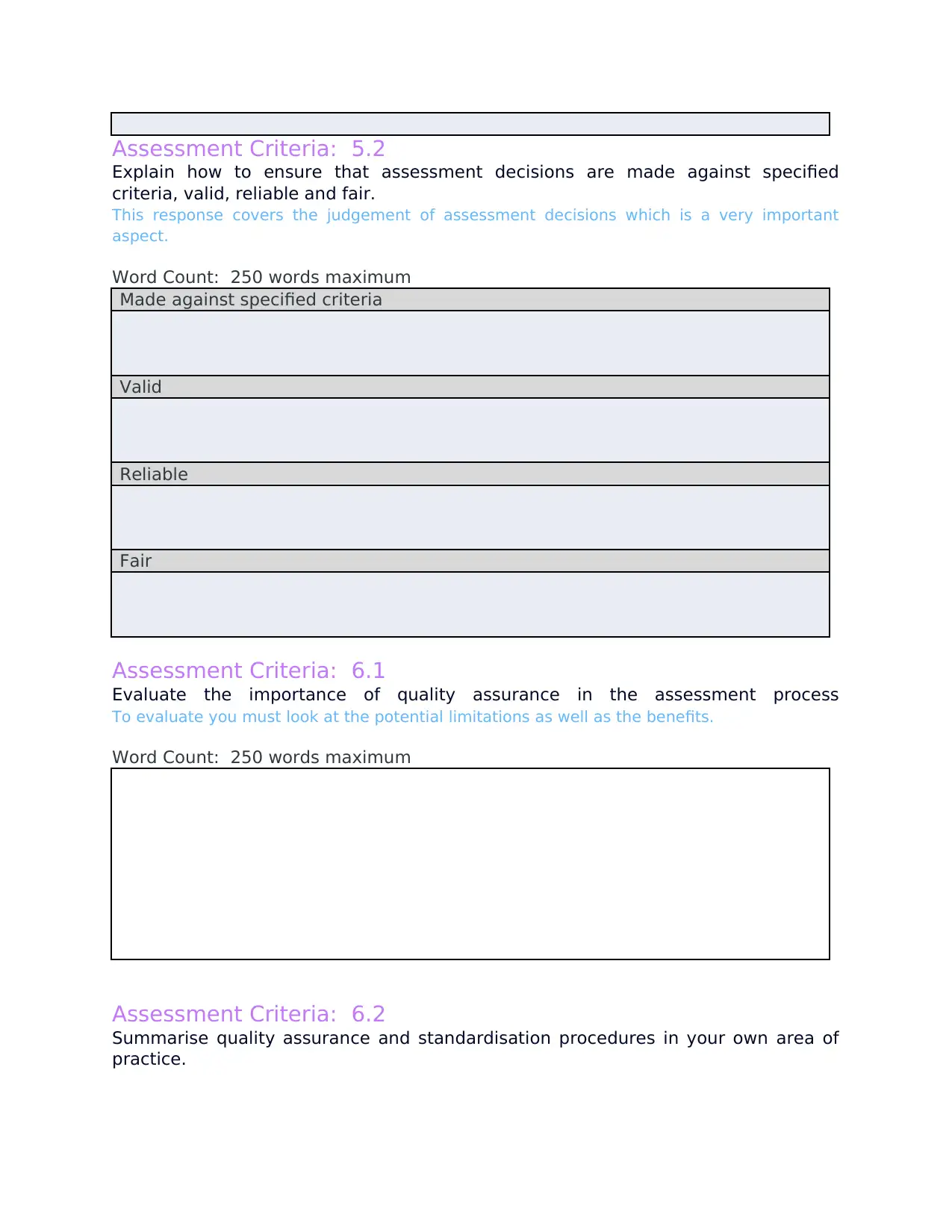
Assessment Criteria: 5.2
Explain how to ensure that assessment decisions are made against specified
criteria, valid, reliable and fair.
This response covers the judgement of assessment decisions which is a very important
aspect.
Word Count: 250 words maximum
Made against specified criteria
Valid
Reliable
Fair
Assessment Criteria: 6.1
Evaluate the importance of quality assurance in the assessment process
To evaluate you must look at the potential limitations as well as the benefits.
Word Count: 250 words maximum
Assessment Criteria: 6.2
Summarise quality assurance and standardisation procedures in your own area of
practice.
Explain how to ensure that assessment decisions are made against specified
criteria, valid, reliable and fair.
This response covers the judgement of assessment decisions which is a very important
aspect.
Word Count: 250 words maximum
Made against specified criteria
Valid
Reliable
Fair
Assessment Criteria: 6.1
Evaluate the importance of quality assurance in the assessment process
To evaluate you must look at the potential limitations as well as the benefits.
Word Count: 250 words maximum
Assessment Criteria: 6.2
Summarise quality assurance and standardisation procedures in your own area of
practice.
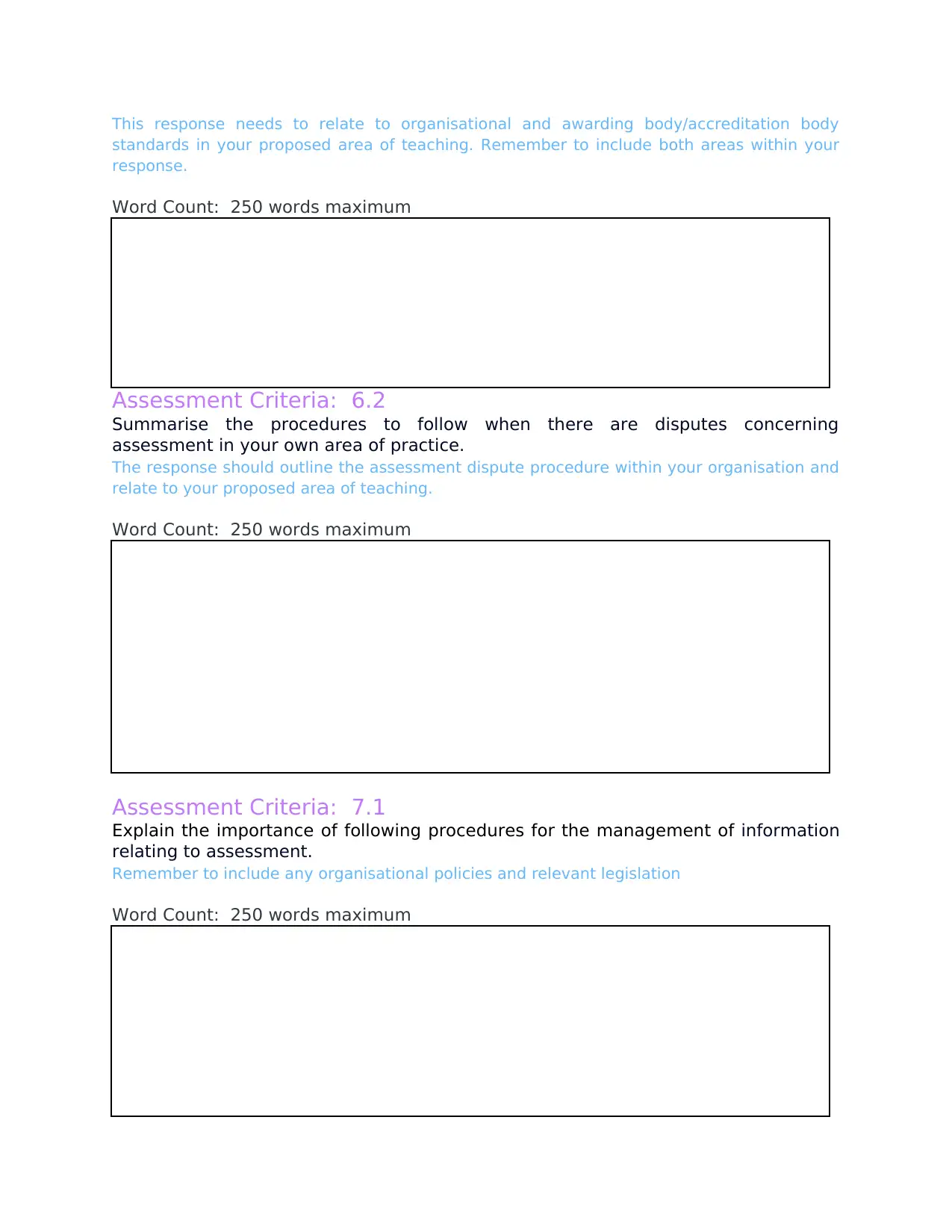
This response needs to relate to organisational and awarding body/accreditation body
standards in your proposed area of teaching. Remember to include both areas within your
response.
Word Count: 250 words maximum
Assessment Criteria: 6.2
Summarise the procedures to follow when there are disputes concerning
assessment in your own area of practice.
The response should outline the assessment dispute procedure within your organisation and
relate to your proposed area of teaching.
Word Count: 250 words maximum
Assessment Criteria: 7.1
Explain the importance of following procedures for the management of information
relating to assessment.
Remember to include any organisational policies and relevant legislation
Word Count: 250 words maximum
standards in your proposed area of teaching. Remember to include both areas within your
response.
Word Count: 250 words maximum
Assessment Criteria: 6.2
Summarise the procedures to follow when there are disputes concerning
assessment in your own area of practice.
The response should outline the assessment dispute procedure within your organisation and
relate to your proposed area of teaching.
Word Count: 250 words maximum
Assessment Criteria: 7.1
Explain the importance of following procedures for the management of information
relating to assessment.
Remember to include any organisational policies and relevant legislation
Word Count: 250 words maximum
You're viewing a preview
Unlock full access by subscribing today!
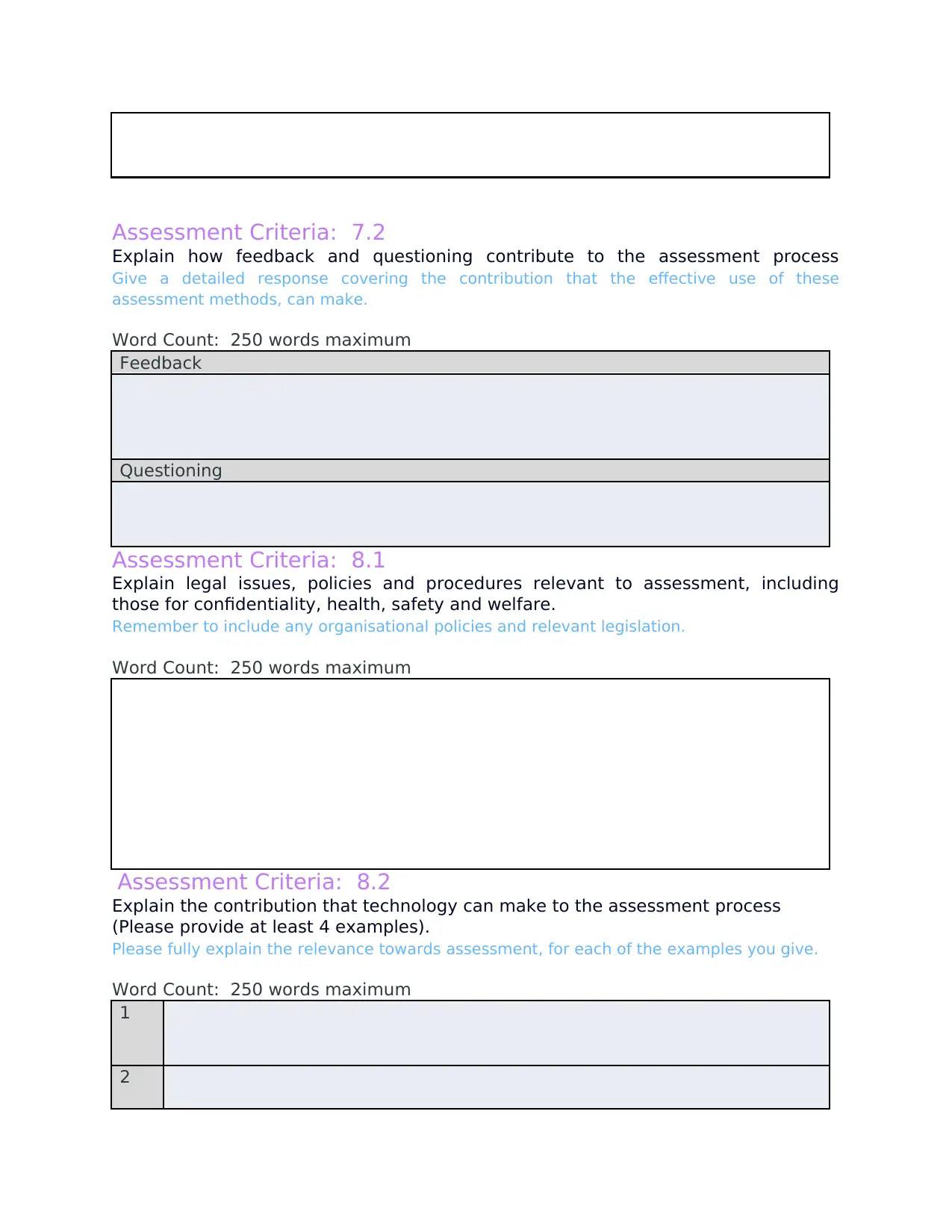
Assessment Criteria: 7.2
Explain how feedback and questioning contribute to the assessment process
Give a detailed response covering the contribution that the effective use of these
assessment methods, can make.
Word Count: 250 words maximum
Feedback
Questioning
Assessment Criteria: 8.1
Explain legal issues, policies and procedures relevant to assessment, including
those for confidentiality, health, safety and welfare.
Remember to include any organisational policies and relevant legislation.
Word Count: 250 words maximum
Assessment Criteria: 8.2
Explain the contribution that technology can make to the assessment process
(Please provide at least 4 examples).
Please fully explain the relevance towards assessment, for each of the examples you give.
Word Count: 250 words maximum
1
2
Explain how feedback and questioning contribute to the assessment process
Give a detailed response covering the contribution that the effective use of these
assessment methods, can make.
Word Count: 250 words maximum
Feedback
Questioning
Assessment Criteria: 8.1
Explain legal issues, policies and procedures relevant to assessment, including
those for confidentiality, health, safety and welfare.
Remember to include any organisational policies and relevant legislation.
Word Count: 250 words maximum
Assessment Criteria: 8.2
Explain the contribution that technology can make to the assessment process
(Please provide at least 4 examples).
Please fully explain the relevance towards assessment, for each of the examples you give.
Word Count: 250 words maximum
1
2
Paraphrase This Document
Need a fresh take? Get an instant paraphrase of this document with our AI Paraphraser

3
1 out of 11
Related Documents
Your All-in-One AI-Powered Toolkit for Academic Success.
+13062052269
info@desklib.com
Available 24*7 on WhatsApp / Email
![[object Object]](/_next/static/media/star-bottom.7253800d.svg)
Unlock your academic potential
© 2024 | Zucol Services PVT LTD | All rights reserved.





